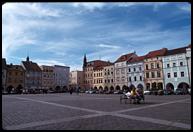

|
Notes from Ceske Budejovice, Czech Republic |
This is the third of four emails that I sent to various friends when I found Internet access during my trip. You can read it, or skip to one of the other three:
You can also download the original ASCII email
archive, probably more suitable for printing.
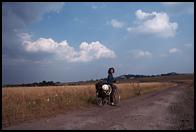 Eastern Europe is not yet the best place for email access. And itīs not
just the crazy keyboards with three accented letters per key (the symbol '@'
is generated with the key sequence Alt+6+4). Sleepy villages lost in the
Polish countryside or perched on a Bohemian hilltop are about as far away
from the Internet as anywhere in Europe. And big cities are not much
better. Take Krakow, for centuries the seat of Polish kings. The official
Telekomunikacija Polska Internet lounge is located in a stylish marble and
polished wood hall on the wonderful main square, but the quality of the
connection has a long way to go to match that of the surroundings. In
Prague the computer situation was much better, but the crowds there made me
run away as fast as I could.
Eastern Europe is not yet the best place for email access. And itīs not
just the crazy keyboards with three accented letters per key (the symbol '@'
is generated with the key sequence Alt+6+4). Sleepy villages lost in the
Polish countryside or perched on a Bohemian hilltop are about as far away
from the Internet as anywhere in Europe. And big cities are not much
better. Take Krakow, for centuries the seat of Polish kings. The official
Telekomunikacija Polska Internet lounge is located in a stylish marble and
polished wood hall on the wonderful main square, but the quality of the
connection has a long way to go to match that of the surroundings. In
Prague the computer situation was much better, but the crowds there made me
run away as fast as I could.
I was really curious when I boarded the ferry from Copenhagen to Swinoujscie, on the northwestern tip of Poland. My Mom is Polish and I speak the language, but I'd never been back after my second birthday. In the early 80s, when my grandma was still alive and living in Poland, I remember news of curfews, martial law, and long lines for little food at grocery stores. Mail would come through opened and stamped by censors. To call Poland, you'd dial the international operator, place your request, then wait at home, sometimes for a day or two. Eventually the operator would call you back, and you'd start paying big money for your (probably monitored) line. Of course, I knew all this is now a distant past; I almost feared the opposite, a country overrun by MTV and McDonald's and happy to drop its distinct character in favor of some imported ideal. What I found made me happy: beautiful landscapes, friendly people, and a country that is quickly becoming wealthier but remains deeply rooted in its Polishness.
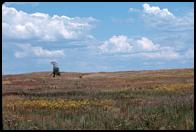 Whereas Norway was mountainous, cold, and wet, Poland was flat, hot, and
dry. Poland's nature and weather took me by surprise: I expected green
rolling countryside and a temperate, maybe humid, climate. But no: apart
from the hills that rise to meet the Carpathians in southern Poland, the
country is as flat as a pancake. Despite this it feels uncannily like
southern Italy (and, to a lesser degree, parts of California): vast pine
forests, dry earth, crickets making noise in the sun-scorched grass. The
pine forests are fragrant and offer respite from the summer heat. Out among
the endless golden fields, heat waves rise from the road and the wheels of a
loaded touring bike leave a little concave line in the hot asphalt, like a
finger moving through sand. Eerily, even roadkill sinks---or is
pushed---into the asphalt: only parts of a small rib cage emerged from the
road, white pattern on black background. Odors are pungent in the heat:
flowers, dry grass, and manure fill the air. My favorite smell is that of
Polish railways, a rich, heavy, clinging scent of hot tar and grease and
dust.
Whereas Norway was mountainous, cold, and wet, Poland was flat, hot, and
dry. Poland's nature and weather took me by surprise: I expected green
rolling countryside and a temperate, maybe humid, climate. But no: apart
from the hills that rise to meet the Carpathians in southern Poland, the
country is as flat as a pancake. Despite this it feels uncannily like
southern Italy (and, to a lesser degree, parts of California): vast pine
forests, dry earth, crickets making noise in the sun-scorched grass. The
pine forests are fragrant and offer respite from the summer heat. Out among
the endless golden fields, heat waves rise from the road and the wheels of a
loaded touring bike leave a little concave line in the hot asphalt, like a
finger moving through sand. Eerily, even roadkill sinks---or is
pushed---into the asphalt: only parts of a small rib cage emerged from the
road, white pattern on black background. Odors are pungent in the heat:
flowers, dry grass, and manure fill the air. My favorite smell is that of
Polish railways, a rich, heavy, clinging scent of hot tar and grease and
dust.
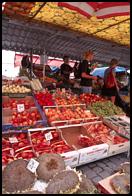 Considering Poland's recent history---it was overrun by Germany from the
west and Russia from the east in a period of three weeks in September 1939,
then almost completely destroyed (6 of 30 million Poles died, I believe) in
WWII, and finally ravaged by 40 years of communist rule---its economic
comeback is quite amazing. Of course, the transition has not been smooth,
and not everyone is happy. For the first time in decades there are homeless
and unemployed people. In Bydgoszcz, not far from Warsaw, I talked with a
middle aged former employee of Poland's biggest bicycle factory, once "bolts
to bicycle" but more recently globalized into an assembly point of mostly
foreign components. He helps his two adult but unemployed daughters make
ends meet, and has trouble deciding whether he prefers the current system
over the former (communist) one. Formerly, one waited in line up to ten
years for a house, but there was never any doubt that one would eventually
receive it. Today one can buy a house on the spot, but according to him
prices are completely out of reach of most common people. My acquaintance
was also disturbed that too much wealth is being concentrated in the hands
of too few people. One encounter with a post-Soviet nouveau-riche man and
one's tempted to agree: BMW with tinted glass, ostentatious black suit, cell
phones (plural), an escort of a couple women in tight tops and vertiginous
mini-skirts. Nothing better than a little cellular pose in the old town
square on a sleepy afternoon.
Considering Poland's recent history---it was overrun by Germany from the
west and Russia from the east in a period of three weeks in September 1939,
then almost completely destroyed (6 of 30 million Poles died, I believe) in
WWII, and finally ravaged by 40 years of communist rule---its economic
comeback is quite amazing. Of course, the transition has not been smooth,
and not everyone is happy. For the first time in decades there are homeless
and unemployed people. In Bydgoszcz, not far from Warsaw, I talked with a
middle aged former employee of Poland's biggest bicycle factory, once "bolts
to bicycle" but more recently globalized into an assembly point of mostly
foreign components. He helps his two adult but unemployed daughters make
ends meet, and has trouble deciding whether he prefers the current system
over the former (communist) one. Formerly, one waited in line up to ten
years for a house, but there was never any doubt that one would eventually
receive it. Today one can buy a house on the spot, but according to him
prices are completely out of reach of most common people. My acquaintance
was also disturbed that too much wealth is being concentrated in the hands
of too few people. One encounter with a post-Soviet nouveau-riche man and
one's tempted to agree: BMW with tinted glass, ostentatious black suit, cell
phones (plural), an escort of a couple women in tight tops and vertiginous
mini-skirts. Nothing better than a little cellular pose in the old town
square on a sleepy afternoon.
Still, most people---especially younger people---think that Poland is moving in the right direction, and I agree. Take, for instance, the kind lady in the little village of Pajeczno who offered us free food and lodging. She could understand why my Mom hasn't been back if she left under communism, but today she proudly displays her bustling and well-stocked grocery store. A relatively large and well-off middle class seems to be emerging: normal Polish families vacationing in Prague like the Germans and Italians, good fresh food in modern grocery stores open around the clock, rusty and dirty old FIATs and Trabants replaced by safer and more efficient modern cars.
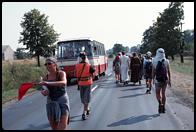 If Poland's wealth is new, its Catholicism is not. The Church is rooted in
the landscape. The first thing you see of a distant town is its church
steeple; sometimes the only hint of the existence of a little hamlet among
the trees on the other side of a big field is the bulbous wooden dome of the
local church. Every year half a million Poles (over 1% of the population!),
many of them on foot, make a pilgrimage to Czestochowa to venerate the holy
icon of the Black Madonna, Queen of Poland. As we ourselves approached
Czestochowa by bike, we saw many, many people walking there, on schedule for
the Marian celebrations of August 15. Most people walk in organized groups
of 50 to 100: teens in reflective vests direct traffic, guitar players and
other musicians entertain, priests preach over loudspeakers mounted on other
people's external frame packs, and the whole merry band moves on. At first
I could only stare in astonishment: some groups were walking almost 1000km
in the middle of summer, 40 or 50km per day! Then I was a little scared by
so much religious fervor. But in the end I could only smile at the energy
and good humor of most of these people.
If Poland's wealth is new, its Catholicism is not. The Church is rooted in
the landscape. The first thing you see of a distant town is its church
steeple; sometimes the only hint of the existence of a little hamlet among
the trees on the other side of a big field is the bulbous wooden dome of the
local church. Every year half a million Poles (over 1% of the population!),
many of them on foot, make a pilgrimage to Czestochowa to venerate the holy
icon of the Black Madonna, Queen of Poland. As we ourselves approached
Czestochowa by bike, we saw many, many people walking there, on schedule for
the Marian celebrations of August 15. Most people walk in organized groups
of 50 to 100: teens in reflective vests direct traffic, guitar players and
other musicians entertain, priests preach over loudspeakers mounted on other
people's external frame packs, and the whole merry band moves on. At first
I could only stare in astonishment: some groups were walking almost 1000km
in the middle of summer, 40 or 50km per day! Then I was a little scared by
so much religious fervor. But in the end I could only smile at the energy
and good humor of most of these people.
Alcoholism is strongly opposed by the Church, but like the Church, it's a fact of Polish life. Enter a bar in any little farming village at 11am on a weekday, and you'll find a handful of middle aged men smoking at a table, a couple of empty beer pitchers and maybe a half-empty bottle or two of vodka in front of them. One evening Rosalba and I sat in a restaurant and watched a handful of Polish soldiers and a few friends quickly finish off five or six bottles of vodka to the sound of old Polish folk music. Wanna-be hard-core US frat boys should come to Poland (or maybe Russia) for a little training. Teens and twenty-year-olds drink too, but they prefer to accompany the alcohol with a repetitive "thump thump thump" from the subwoofers of their black VWs. In the Polish countryside it is disturbingly easy to run into relatively scary young men: Nazi-skinhead look, loud thumping music, vodka at 10am.
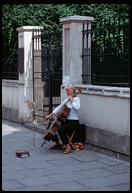 Speaking of music, I feel as if the entire former East Block is living in an
80s time warp. Cycle through any village in Poland, Slovakia, or the Czech
Republic, and you'll hear pop hits I hadn't heard since high school or
earlier: Cliff Richard, Duran Duran, Depeche Mode, Pet Shop Boys, and much,
much more. It's tough to cycle all day when your head is filled with Simon
Le Bon (there was a time when Italian 15-year-old girls swooned at the very
name) shouting "Wild Boys" over and over. The exception, of course, is
Prague, proud of its association with Mozart, Dvorak, Smetana, and other
famous composers. Almost every other church hosts daily or more frequent
performances of classical music; you can hear it as you walk the quaint
little streets of the old town. The idea is good, but the repertoire
somewhat stagnant: Vivaldi's "Four Seasons" and Mozart's "Eine Kleine
Nachtmusik," over and over, just so grandma on the tour bus from Milan or
Barcelona can enjoy a feeling of recognition. Bleh.
Speaking of music, I feel as if the entire former East Block is living in an
80s time warp. Cycle through any village in Poland, Slovakia, or the Czech
Republic, and you'll hear pop hits I hadn't heard since high school or
earlier: Cliff Richard, Duran Duran, Depeche Mode, Pet Shop Boys, and much,
much more. It's tough to cycle all day when your head is filled with Simon
Le Bon (there was a time when Italian 15-year-old girls swooned at the very
name) shouting "Wild Boys" over and over. The exception, of course, is
Prague, proud of its association with Mozart, Dvorak, Smetana, and other
famous composers. Almost every other church hosts daily or more frequent
performances of classical music; you can hear it as you walk the quaint
little streets of the old town. The idea is good, but the repertoire
somewhat stagnant: Vivaldi's "Four Seasons" and Mozart's "Eine Kleine
Nachtmusik," over and over, just so grandma on the tour bus from Milan or
Barcelona can enjoy a feeling of recognition. Bleh.
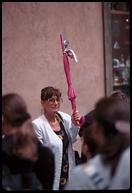 Unfortunately, "bleh" is sort of how I feel about my whole visit to Prague.
To say that the place is overrun with tourists is an understatement, sort of
like saying that the Mariana's Trench is overrun with water. There are
areas of the old town and the castle where you literally cannot move, more
or less like in St Peter's Square in Rome when the Pope holds a Mass or
blessing there. Czech is far from the most spoken language in the historic
center, trailing Italian (by far the largest single nationality of tourists,
many of them retirees there for one day on frightening "Europe in a week"
bus tours), Spanish, English, and maybe even German and Japanese.
Restaurants, hotels, and even youth hostels make a killing, charging rates
many times higher than elsewhere in the Czech Republic. There are 19
McDonald's restaurants and one of the largest Dunkin' Donuts I've ever seen.
After accompanying Rosalba to the airport, I was quite eager to get back
on the bike and out of the city. If I ever return it will be in the lowest
possible season, maybe March, or November.
Unfortunately, "bleh" is sort of how I feel about my whole visit to Prague.
To say that the place is overrun with tourists is an understatement, sort of
like saying that the Mariana's Trench is overrun with water. There are
areas of the old town and the castle where you literally cannot move, more
or less like in St Peter's Square in Rome when the Pope holds a Mass or
blessing there. Czech is far from the most spoken language in the historic
center, trailing Italian (by far the largest single nationality of tourists,
many of them retirees there for one day on frightening "Europe in a week"
bus tours), Spanish, English, and maybe even German and Japanese.
Restaurants, hotels, and even youth hostels make a killing, charging rates
many times higher than elsewhere in the Czech Republic. There are 19
McDonald's restaurants and one of the largest Dunkin' Donuts I've ever seen.
After accompanying Rosalba to the airport, I was quite eager to get back
on the bike and out of the city. If I ever return it will be in the lowest
possible season, maybe March, or November.
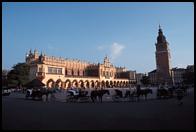 Krakow, Poland, the other major city we visited, is less impressive
architecturally but rather more pleasant. The huge main market square,
apparently the largest of its kind in Central Europe, is the ideal place for
sitting back, relaxing, and eating some "Wloskie Lody"---Italian ice cream,
what else? The crime rate is low, especially by western standards: the only
visible problem is the occasional drunk who pisses on the wall or harrasses
a tourist. Such rowdies are easily kept at bay by mean-looking young men
who work for private security agencies. They carry big sticks and wear
intimidating all-black outfits. The backs of their jackets prominently
display the name of their security agency: Justus, Komandos, and other names
that seem made to order for a Schwarzenegger movie. I can just see Arnold
starring in the role of a Polish security officer.
Krakow, Poland, the other major city we visited, is less impressive
architecturally but rather more pleasant. The huge main market square,
apparently the largest of its kind in Central Europe, is the ideal place for
sitting back, relaxing, and eating some "Wloskie Lody"---Italian ice cream,
what else? The crime rate is low, especially by western standards: the only
visible problem is the occasional drunk who pisses on the wall or harrasses
a tourist. Such rowdies are easily kept at bay by mean-looking young men
who work for private security agencies. They carry big sticks and wear
intimidating all-black outfits. The backs of their jackets prominently
display the name of their security agency: Justus, Komandos, and other names
that seem made to order for a Schwarzenegger movie. I can just see Arnold
starring in the role of a Polish security officer.
And if Krakow is still too big for you, there are plenty of small and splendid towns: Torun, the birthplace of Copernicus and a wonder of Gothic architecture; Litomysl, a quaint town that grew as a Moravian trading center; Ceske Budejovice, the town I'm in right now, famous for its breweries; and many other beautiful and often tiny places.
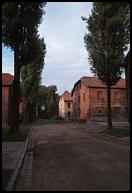 There is also one place that I'll always remember, but not for its beauty.
The neighboring towns of Oswiecim and Brzezinka are, unfortunately, much
better known by their German transliterations: Auschwitz and Birkenau. This
was the site of the largest Nazi concentration camp: approximately 1.5
million people died here in a period of just over three years, more than one
thousand per day. There were two main camps, Auschwitz-I in Oswiecim, and
Auschwitz-II (Birkenau) in Brzezinka, which was built to accommodate the
"overflow." There were also forty or so minor camps in the region, but most
of these no longer exist. I don't feel I can write anything adequate about
these places, but will nonetheless share my main impressions. First, there
was surprise at the unexpected appearance of Auschwitz-I. Trees were
planted on the camp after the war: the tidy red brick buildings set among
shady tree-lined gravel lanes reminded me of nothing so much as a New
England college. Dumb tourists posed all-smiles under the communal gallows,
just like tourists pose in front of John Harvard's statue in Harvard Yard.
Externally, only the miles of barbed wire along the perimeter hinted at the
real story. My second indelible memory is a picture of kittens washing
themselves and children at play in water. Of course, any killing, and
especially such mass killing of civilians, requires inordinate amounts of
cynicism. I had arrived ready for a lot of cynicism and cruelty: after
reading Elie Wiesel (I hope I'm spelling the name correctly, it's been a
while) I was prepared---as much as one can be, at least---for the gas
chambers and the ovens, and even for the chamber of death by hunger, and
that of death by suffocation, and that of death by whipping. I even managed
to deal with the asphalt roller that was pulled by inmates who were whipped
into moving on even when one of them would collapse into the path of the
roller. The proverbial straw that broke my back were the drawings in the
men's "washing room," a couple of troughs that were used by hundreds or
thousands of prisoners. There, above the filth, were pictures of happy men
bathing, children at play, and the kittens washing. Maybe they were the
work of an inmate; otherwise, I don't know what to say. My third memory is
size. 1.5 million is too large a number to really picture. But the
There is also one place that I'll always remember, but not for its beauty.
The neighboring towns of Oswiecim and Brzezinka are, unfortunately, much
better known by their German transliterations: Auschwitz and Birkenau. This
was the site of the largest Nazi concentration camp: approximately 1.5
million people died here in a period of just over three years, more than one
thousand per day. There were two main camps, Auschwitz-I in Oswiecim, and
Auschwitz-II (Birkenau) in Brzezinka, which was built to accommodate the
"overflow." There were also forty or so minor camps in the region, but most
of these no longer exist. I don't feel I can write anything adequate about
these places, but will nonetheless share my main impressions. First, there
was surprise at the unexpected appearance of Auschwitz-I. Trees were
planted on the camp after the war: the tidy red brick buildings set among
shady tree-lined gravel lanes reminded me of nothing so much as a New
England college. Dumb tourists posed all-smiles under the communal gallows,
just like tourists pose in front of John Harvard's statue in Harvard Yard.
Externally, only the miles of barbed wire along the perimeter hinted at the
real story. My second indelible memory is a picture of kittens washing
themselves and children at play in water. Of course, any killing, and
especially such mass killing of civilians, requires inordinate amounts of
cynicism. I had arrived ready for a lot of cynicism and cruelty: after
reading Elie Wiesel (I hope I'm spelling the name correctly, it's been a
while) I was prepared---as much as one can be, at least---for the gas
chambers and the ovens, and even for the chamber of death by hunger, and
that of death by suffocation, and that of death by whipping. I even managed
to deal with the asphalt roller that was pulled by inmates who were whipped
into moving on even when one of them would collapse into the path of the
roller. The proverbial straw that broke my back were the drawings in the
men's "washing room," a couple of troughs that were used by hundreds or
thousands of prisoners. There, above the filth, were pictures of happy men
bathing, children at play, and the kittens washing. Maybe they were the
work of an inmate; otherwise, I don't know what to say. My third memory is
size. 1.5 million is too large a number to really picture. But the
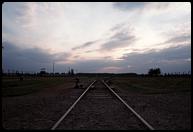 Auschwitz museum still contains the loot that remained in the camp when it
was liberated: 40000 pairs of shoes, a mountain large enough to fill a large
classroom to the ceiling; several tons of human hair; huge piles of
toothbrushes, spectacles, and other belongings. All this pales compared to
Birkenau. Unlike Auschwitz-I, Birkenau was partially destroyed by the
retreating Nazis; today there is no museum there, just the camp more or less
as it appeared to Russian troops in 1945. But it's still by far the most
shocking sight. At 175 hectares (equivalent to a rectangle 1km x 1.75km), I
believe it is bigger than the MIT campus. At dusk we stood in the middle of
the camp, on the railway tracks where victims were unloaded, and there was
nothing but chimneys and the remains of prison huts in every direction,
almost as far as the eye could see. It filled me with a strange fear that
is difficult to describe; not a rational adult fear so much as the feeling
that I had when I was little and afraid of the dark and of the ghost in the
closet of my grandma's room. It was less than an hour before I could no
longer stay; I cycled away as fast as Rosalba could follow.
Auschwitz museum still contains the loot that remained in the camp when it
was liberated: 40000 pairs of shoes, a mountain large enough to fill a large
classroom to the ceiling; several tons of human hair; huge piles of
toothbrushes, spectacles, and other belongings. All this pales compared to
Birkenau. Unlike Auschwitz-I, Birkenau was partially destroyed by the
retreating Nazis; today there is no museum there, just the camp more or less
as it appeared to Russian troops in 1945. But it's still by far the most
shocking sight. At 175 hectares (equivalent to a rectangle 1km x 1.75km), I
believe it is bigger than the MIT campus. At dusk we stood in the middle of
the camp, on the railway tracks where victims were unloaded, and there was
nothing but chimneys and the remains of prison huts in every direction,
almost as far as the eye could see. It filled me with a strange fear that
is difficult to describe; not a rational adult fear so much as the feeling
that I had when I was little and afraid of the dark and of the ghost in the
closet of my grandma's room. It was less than an hour before I could no
longer stay; I cycled away as fast as Rosalba could follow.
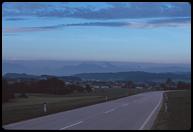 It's odd to be pedaling alone again after so many miles with someone---first
my new German friend Bernd in Norway, then Rosalba all the way to Prague. I
cycle faster and longer, but it's not really as much fun. People say it's
easier to meet strangers when you're alone, but that's not always true,
especially with Rosalba there to offset my tall-gaunt-sunburned-scary-man
look. Tomorrow I'll be leaving the Czech Republic and entering Austria.
From there, it will be another day or two to Rosenheim, in southern Germany,
where I'll stop to visit Bernd. Then I'll head south, across the Alps and
into Italy. Hopefully Internet access will be easier to come by there.
It's odd to be pedaling alone again after so many miles with someone---first
my new German friend Bernd in Norway, then Rosalba all the way to Prague. I
cycle faster and longer, but it's not really as much fun. People say it's
easier to meet strangers when you're alone, but that's not always true,
especially with Rosalba there to offset my tall-gaunt-sunburned-scary-man
look. Tomorrow I'll be leaving the Czech Republic and entering Austria.
From there, it will be another day or two to Rosenheim, in southern Germany,
where I'll stop to visit Bernd. Then I'll head south, across the Alps and
into Italy. Hopefully Internet access will be easier to come by there.
Go on to Notes from Serra San Bruno, Italy.
| Top |